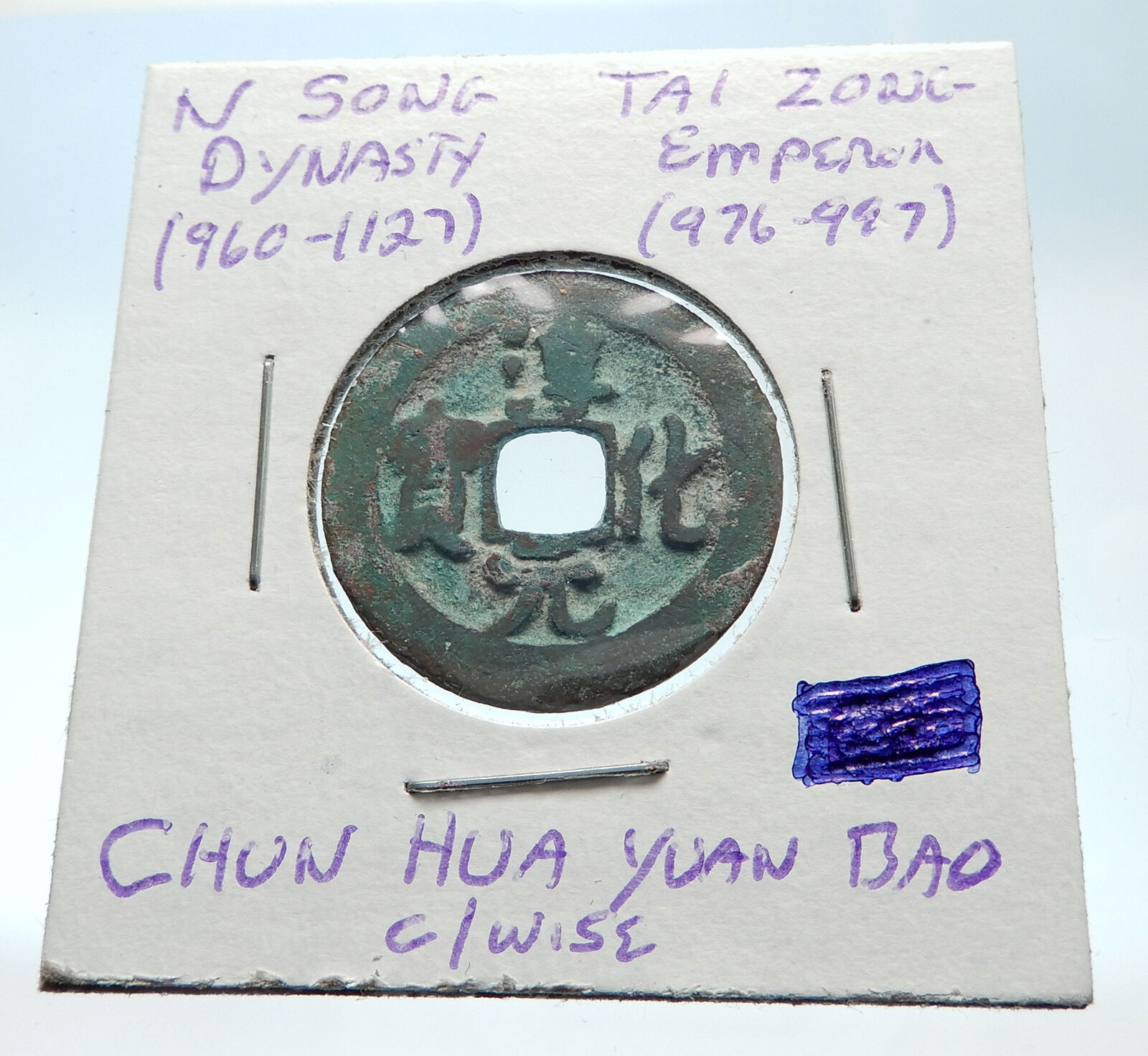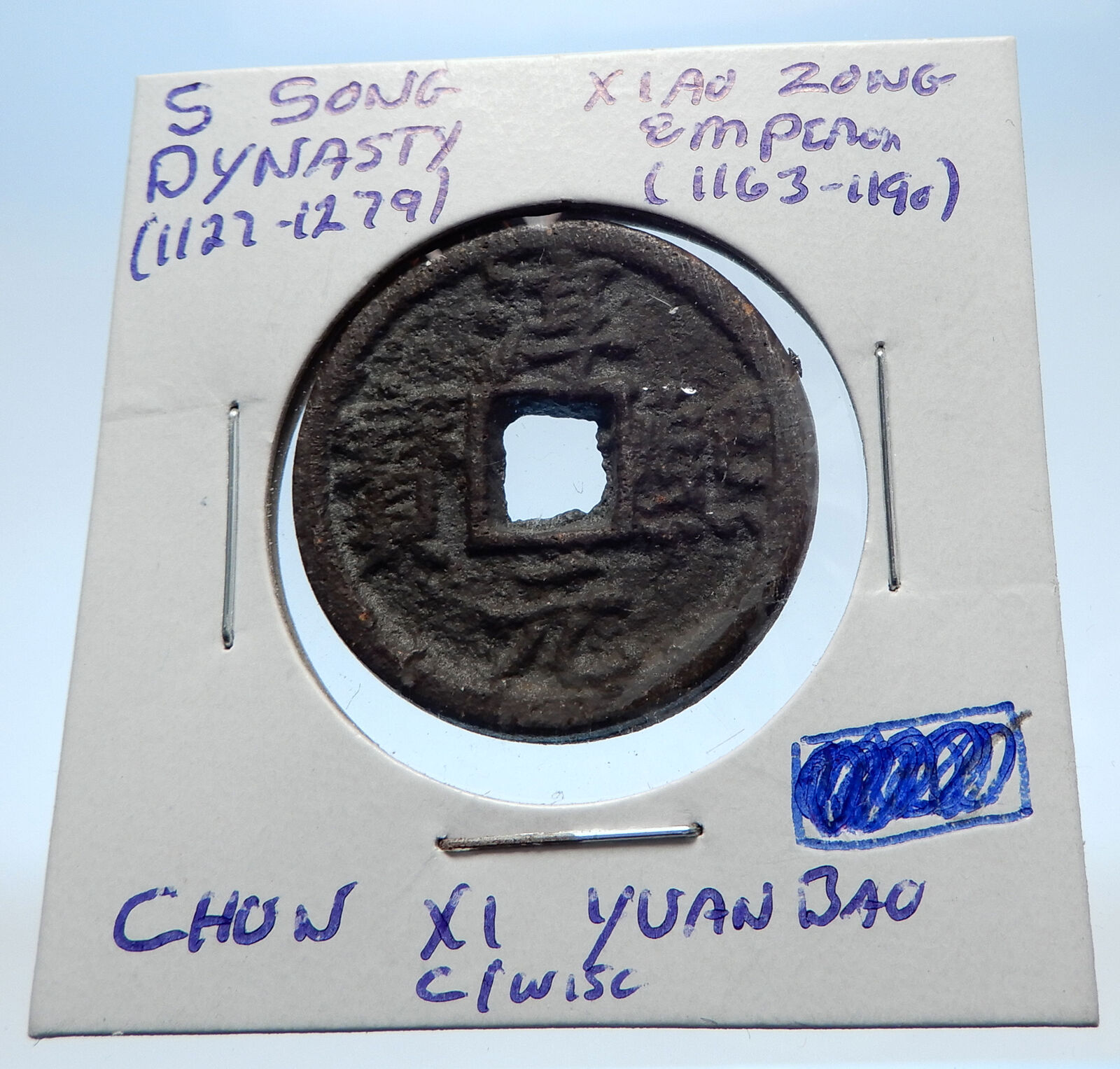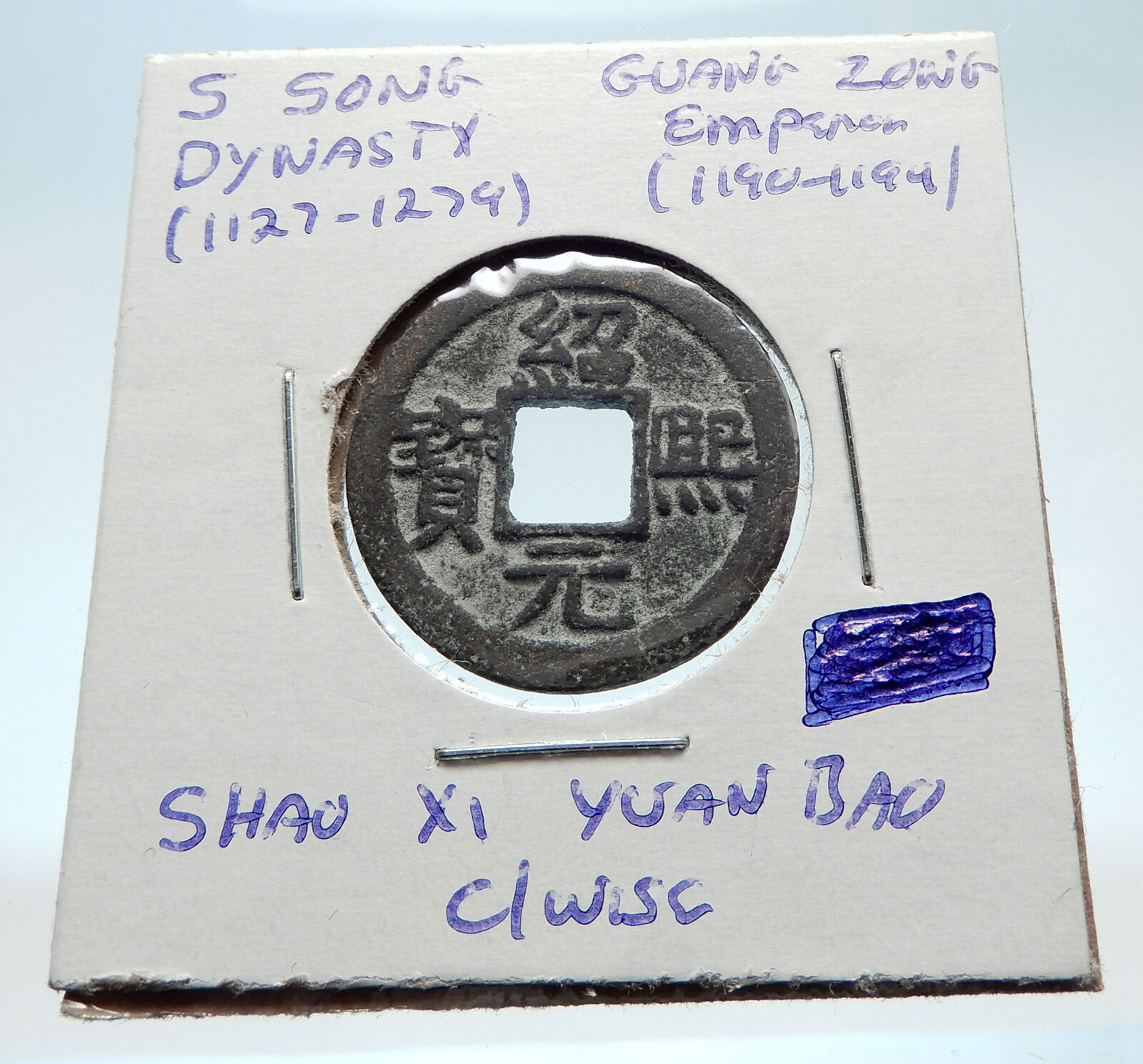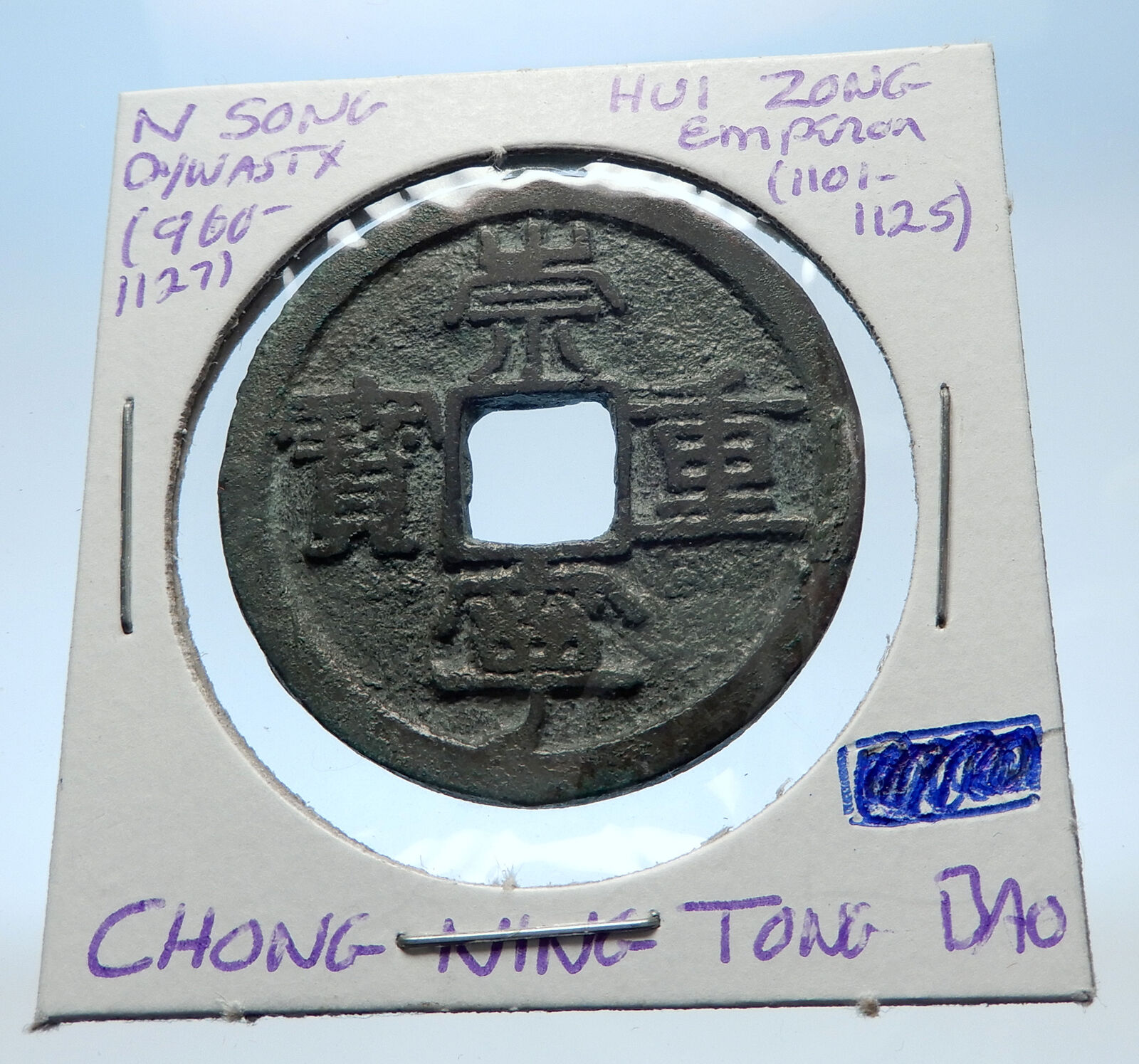|
China – Southern
Dynasties (502-557 AD) – Liang Dynasty (502-557 AD)
Emperor Yuan (552-555 AD)
Bronze Liang Zhu Wu Zhu Cash Token 23mm, Struck 555 AD
Reference: H# 10.19
Chinese Symbols.
You are bidding on the exact item pictured, provided with a Certificate of Authenticity and Lifetime Guarantee of Authenticity.
Emperor Yuan of Liang (Chinese: 梁元帝;
pinyin: Liáng Yuándì) (16 September 508 – 27
January 555), personal name Xiao Yi (蕭繹),
courtesy name Shicheng (世誠), nickname Qifu (七符),
was an emperor of the Chinese Liang Dynasty.
After his father Emperor Wu and brother Emperor
Jianwen were successively taken hostage and
controlled by the rebel general Hou Jing, Xiao
Yi was largely viewed as the de facto leader of
Liang, and after defeating Hou in 552 declared
himself emperor. In 554, after offending Yuwen
Tai, the paramount general of rival Western Wei,
Western Wei forces descended on and captured his
capital Jiangling (江陵, in modern Jingzhou, Hubei),
executing him and instead declaring his nephew
Xiao Cha (Emperor Xuan) the Emperor of Liang.
Emperor Yuan was a renowned writer and
collector of ancient books, but was criticized
by historians for concentrating on eliminating
potential contenders for the throne rather than
on fighting Hou Jing. As Jiangling was besieged
by Western Wei troops, Emperor Yuan set his
collection of more than 140,000 volumes of
ancient books on fire, and this is commonly
considered one of the greatest disasters for the
study of ancient works in Chinese history.
 The Liang dynasty (Chinese: 梁朝; pinyin: Liáng Cháo) (502–557), also known as the Southern Liang (Chinese: 南梁; pinyin: Nán Liáng), was the third of the Southern Dynasties during China’s Southern and Northern Dynasties period. It was located in South China and succeeded by the Chen dynasty in 557. The small rump state Western Liang, located in Central China, continued until it was conquered in 587 by the Sui dynasty. The Liang dynasty (Chinese: 梁朝; pinyin: Liáng Cháo) (502–557), also known as the Southern Liang (Chinese: 南梁; pinyin: Nán Liáng), was the third of the Southern Dynasties during China’s Southern and Northern Dynasties period. It was located in South China and succeeded by the Chen dynasty in 557. The small rump state Western Liang, located in Central China, continued until it was conquered in 587 by the Sui dynasty.
During the Liang dynasty, in 547 a Persian embassy paid tribute to the Liang, amber was recorded as originating from Persia by the Book of Liang.[4]
In 548, Hou Jing Prince of Henan started a rebellion with Xiao Zhengde the Prince of Linhe, nephew and a former heir of Emperor Wu of Liang and installed Xiao Zhengde as emperor. In 549, Hou sacked Jiankang, deposed and killed Xiao Zhengde, seized the power and put Emperor Wu effectively under house arrest. He dismissed the armies opposed to him in the name of Emperor Wu. In 550 Emperor Wu died, Hou created Emperor Wu’s third son Crown Prince Gang Emperor Jianwen of Liang, also effectively under house arrest. He also attempted to suppress those who would not submit to him.
At the same time the Liang princes fought with each other rather than try to eliminate Hou: Emperor Wu’s seventh son Xiao Yi Prince of Xiangdong killed his nephew Xiao Yu the Prince of Hedong, forcing Xiao Yu’s younger brother Xiao Cha Prince of Yueyang to surrender to the Western Wei; Xiao Yi also attacked his sixth brother Xiao Guan Prince of Shaoling, forcing him to surrender to Northern Qi. Both Xiao Cha and Xiao Guan were created Prince of Liang. However, as Xiao Yi also allied with Northern Qi, Northern Qi gave up their support of Xiao Guan; Xiao Guan was defeated by Hou and finally killed by Western Wei. Xiao Ji the Prince of Wuling the youngest son of Emperor Wu claimed imperial title.
In 551, Hou forced Emperor Jianwen to abdicate to his grandnephew Xiao Dong the Prince of Yuzhang, then killed Emperor Jianwen and forced Xiao Dong to abdicate to him. Hou established a new dynasty named Han. In 552, Xiao Yi destroyed Han and claimed the imperial title as Emperor Yuan of Liang. He also ordered his subordinates to kill Xiao Dong and Xiao Dong’s younger brothers. He created his headquarter Jiangling capital instead of returning to Jiankang. He also managed to eliminate Xiao Ji, but in order to do this he allied with Western Wei, who in turn conquered Yi Province (Sichuan).
In 553, Northern Qi attacked Liang, aiming to install a nephew of Emperor Wu, Xiao Tui the Marquess of Xiangyin, as emperor, but was defeated.
As the relationship between Emperor Yuan and Western Wei was deteriorating, in 555, Western Wei army sacked Jiangling, forcing Emperor Yuan to surrender, and killed Emperor Yuan as well as his sons before installing Xiao Cha as emperor of (Western) Liang at Jiangling.
Liang generals led by Wang Sengbian declared Xiao Fangzhi Prince of Jin’an, the only living son of Emperor Yuan, as Prince of Liang at Jiankang, aiming to crown him the new emperor, but the Northern Qi army defeated them, forcing them into an agreement to recognise a nephew of Emperor Wu, Xiao Yuanming the Marquess of Zhenyang, as emperor instead. Wang requested that Xiao Fangzhi be created Crown Prince and Xiao Yuanming agreed. General Chen Baxian launched a raid that killed Wang in favor of Xiao Fangzhi while denouncing Wang for surrendering to Northern Qi. Xiao Yuanming was forced to abdicate to Xiao Fangzhi, who was known as Emperor Jing of Liang, and Chen seized power. He initially claimed Liang a subject of Northern Qi but later defeated the army of Northern Qi.
In 557, Chen Baxian established the new powerful Chen dynasty. Liang general Wang Lin also claimed Xiao Zhuang Prince of Yongjia grandson of Emperor Yuan emperor. In 560, the Chen dynasty defeated Xiao Zhuang who fled to the Northern Qi and was created Prince of Liang in 570. The small and weak Western Liang state existed until 587 when Sui dynasty destroyed it.
Cash was a type of coin of China and East Asia, used from the 4th century BC until the 20th century AD. Originally cast during the Warring States period, these coins continued to be used for the entirety of Imperial China as well as under Mongol, and Manchu rule. The last Chinese cash coins were cast in the first year of the Republic of China. Generally most cash coins were made from copper or bronze alloys, with iron, lead, and zinc coins occasionally used less often throughout Chinese history. Rare silver and gold cash coins were also produced. During most of their production, cash coins were cast but, during the late Qing dynasty, machine-struck cash coins began to be made. As the cash coins produced over Chinese history were similar, thousand year old cash coins produced during the Northern Song dynasty continued to circulate as valid currency well into the early twentieth century.
In the modern era, these coins are considered to be Chinese “good luck coins”; they are hung on strings and round the necks of children, or over the beds of sick people. They hold a place in various superstitions, as well as Traditional Chinese medicine, and Feng shui. Currencies based on the Chinese cash coins include the Japanese mon, Korean mun, Ryukyuan mon, and Vietnamese văn.
|





 The Liang dynasty (Chinese: 梁朝; pinyin: Liáng Cháo) (502–557), also known as the Southern Liang (Chinese: 南梁; pinyin: Nán Liáng), was the third of the Southern Dynasties during China’s Southern and Northern Dynasties period. It was located in South China and succeeded by the Chen dynasty in 557. The small rump state Western Liang, located in Central China, continued until it was conquered in 587 by the Sui dynasty.
The Liang dynasty (Chinese: 梁朝; pinyin: Liáng Cháo) (502–557), also known as the Southern Liang (Chinese: 南梁; pinyin: Nán Liáng), was the third of the Southern Dynasties during China’s Southern and Northern Dynasties period. It was located in South China and succeeded by the Chen dynasty in 557. The small rump state Western Liang, located in Central China, continued until it was conquered in 587 by the Sui dynasty.




